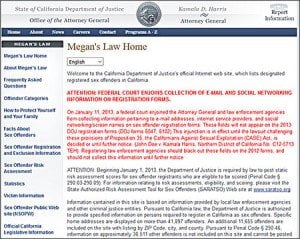Penal Code section 290 PC, California’s Sex Offender Registration Act – also known as Megan’s Law – requires state residents who have been convicted of sex crimes to register with their local law enforcement agency.

If an individual is required to register and knowingly and willfully fails to do so, they can be charged and prosecuted for a misdemeanor or a felony, depending on the nature of the sex offense conviction which resulted in the requirement to register.
California Penal Code section 290 is also referred to California’s Sex Offender Registration Act or Megan’s Law. It requires anyone who is a resident of California who has been convicted of a sex crime to register with the law enforcement agency where they live. Not only must a sex offender register, but they are also required to renew their registration every year, or any time they move to a different residence.
Failure to register as a sex offender
The state of California offers a web site, http://www.meganslaw.ca.gov/, where sex offender registration info can be searched and viewed by the general public.
If a defendant is required to register and knowingly and willfully fails to do so, they can be found guilty of failing to register as a sex offender.
To secure a conviction under 290 PC, the prosecution must prove beyond a reasonable doubt all of the following elements of the crime:
- The defendant was convicted of a sex crime under California law that required sex offender registry as specified by 290 PC.
- The defendant resided in California.
- The defendant was aware of their duty to register.
- The defendant willfully failed to register or update their registration as required by 290 PC.
Criminal penalties
If the original sex crime requiring registration was a misdemeanor, then failing to register will also be a misdemeanor, and the defendant may be sentenced to up to one year in county jail.
If the original conviction was a felony – or the defendant’s second or subsequent sex crime conviction – then failing to register is a felony, and the defendant may be sentenced to 16 months to three years in state prison.
Mandatory sex offender registration
Crimes that require an individual to register as a lifetime sex offender under 290 PC include:
- Sexual battery (243.4 PC)
- Rape (261, 262 PC) or aiding/abetting rape (264.1 PC)
- Pimping/pandering a minor (266h, 266i PC)
- Child procurement (266j PC)
- Aggravated sexual assault on a child under age 14 (269 PC)
- Contributing to the delinquency of a child with lewd/lascivious conduct (272 PC)
- Incest (285 PC)
- Sodomy (286 PC)
- Lewd/lascivious act(s) with a minor (288 PC)
- Oral copulation (288a PC)
- Showing minors obscene material (288.2 PC)
- Contacting a minor with intent to commit a certain felony (288.3 PC)
- Arranging to meet a minor for lewd purposes (288.4 PC)
- Ongoing sexual abuse of a minor (288.5 PC)
- Sodomy with a child under ten (288.7 PC)
- Sexual penetration by force/fear (289 PC)
- Child pornography (311.1-311.11 PC)
- Indecent exposure (314 PC)
- Molesting/annoying a minor (647.6 PC)
- Solicitation in order to commit a sex offense [653f(c) PC]
In addition, registration is required for anyone convicted of any other offense which includes an element of any of the above (or anyone convicted for a conspiracy to commit or attempt of any of the above). For this reason, someone convicted of kidnapping would be required to register as a sex offender if they committed the kidnapping with the intent to rape the victim, even if rape did not occur.
Finally, a court may require anyone convicted of any crime to register as a sex offender, even if that crime is not specified by 290 PC. For example, a judge may order a defendant convicted of a violation of PC 647(i) – California’s “Peeping Tom” law – to register as a sex offender if they committed the offense for their sexual gratification.
Legal defenses
The penalties for a violation of 290 PC can be severe. Anyone accused of not registering as a sex offender when required should seek advice appropriate to their situation from a qualified criminal defense attorney. Common legal defenses include:
- The defendant did not willfully fail to register.
- The defendant tried to register, but his/her information was lost, misplaced, or not received.









